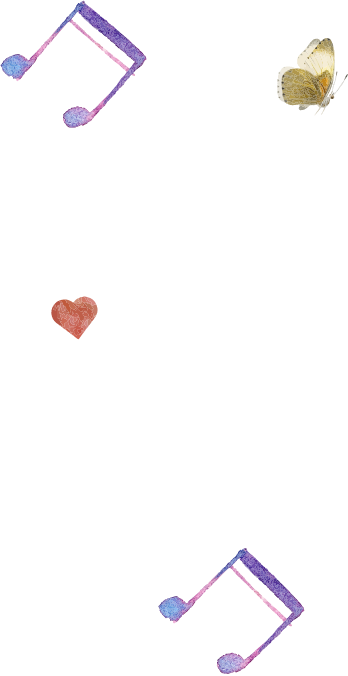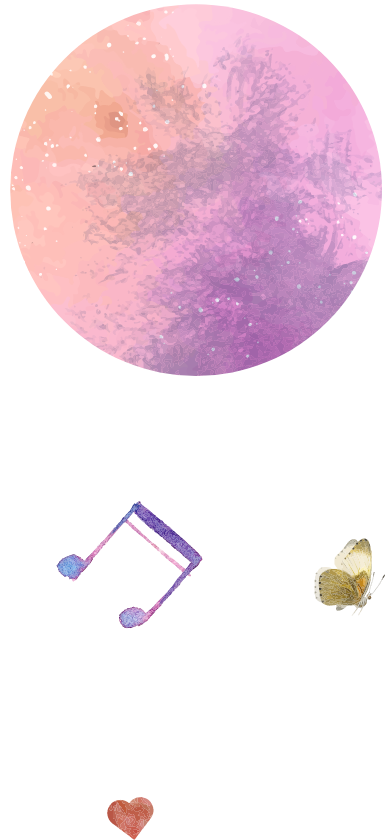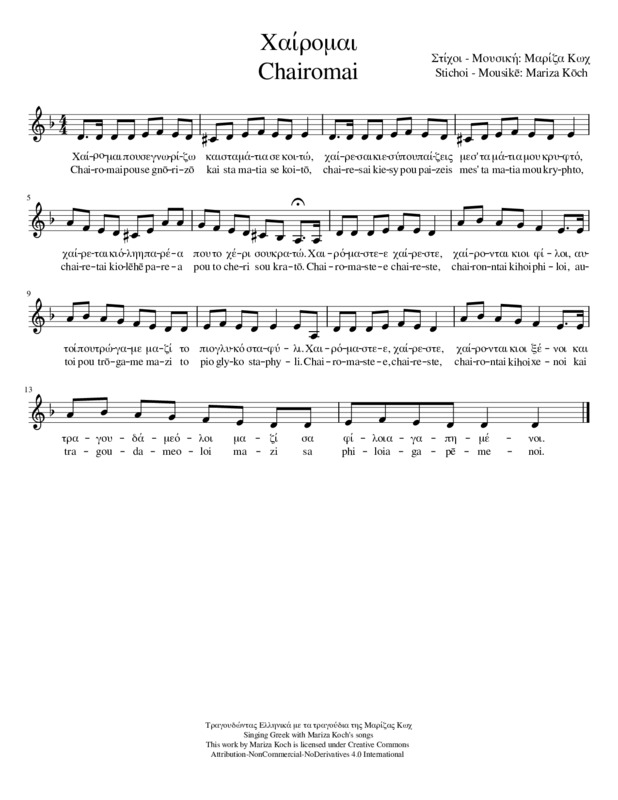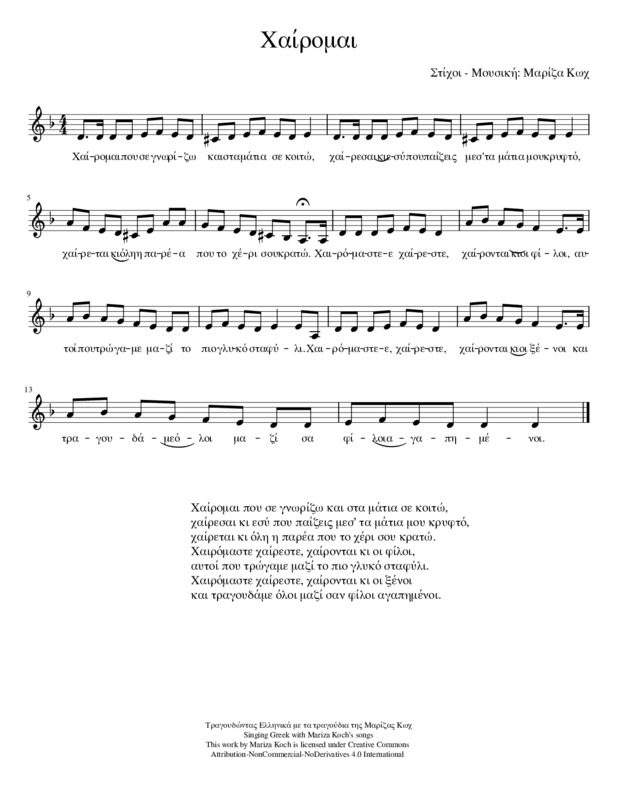
Chairomai

Chairomai
Pronunciation
Articulation of the consonant /χ/ (ch) and practice its articulation using words found in the song, as well as other words [χέρι (cheri, hand), χαίρομαι (chairomai, rejoice), χαρά (chara, happiness), etc.]
Speech Comprehension and Production
Conjugation of the verb “chairomai” (rejoice) in the passive voice. Identify the different persons of the verb “rejoice” in the lyrics of the song.
Conjugation of the verb in active voice "παίζω" (paizō, to play). Identify the persons of the song.
Metaphor: “παίζεις μεσ’ τα μάτια μου κρυφτό” (paizeis mes’ ta matia mou kryphto). The pupils interpret the meaning of metaphor.
Folk couplets: ”οι φίλοι, αυτοί που τρώγαμε μαζί το πιο γλυκό σταφύλι” (oi philoi, aphtoi pou trōgame mazi to pio glyko staphyli).Refer to the poem of Zacharias Papantōniou “Το Τσιριτρό” (Το Τσιριτρό) and identify the corresponding phrase.
Cross rhyme: κοιτώ-κρυφτό (koitō-kryphto) (to look- hide and seek), φίλοι-σταφύλι (philoi-staphyli) (friends-grape), ξένοι-αγαπημένοι (xenoi-agapēmenoi) (strangers-loved ones).
Conjugation of the verb in active voice "παίζω" (paizō, to play). Identify the persons of the song.
Metaphor: “παίζεις μεσ’ τα μάτια μου κρυφτό” (paizeis mes’ ta matia mou kryphto). The pupils interpret the meaning of metaphor.
Folk couplets: ”οι φίλοι, αυτοί που τρώγαμε μαζί το πιο γλυκό σταφύλι” (oi philoi, aphtoi pou trōgame mazi to pio glyko staphyli).Refer to the poem of Zacharias Papantōniou “Το Τσιριτρό” (Το Τσιριτρό) and identify the corresponding phrase.
Cross rhyme: κοιτώ-κρυφτό (koitō-kryphto) (to look- hide and seek), φίλοι-σταφύλι (philoi-staphyli) (friends-grape), ξένοι-αγαπημένοι (xenoi-agapēmenoi) (strangers-loved ones).
Music Activities
Music and emotion: listen to music excerpts and recognize the emotion that they highlight. Expression of pupils' feelings in musical improvisations.
Greetings acknowledging all the students initially and then to each pupil separately, singing only the first sentence and completing the name e.g. “χαίρομαι που σε γνωρίζω Κωσταντίνε σε κοιτώ” (chairomai pou se gnōrizō Kōnstantine se koitō).
Song in combination with mimetic movements and movement in space.
Rhythmic patterns in 4/4: reading and performance with visual material and simultaneous singing with syllables.
Listening and learning of the song "To Tsiritro" with lyrics by Z. Papantōniou & music by G. Lampelet.
Greetings acknowledging all the students initially and then to each pupil separately, singing only the first sentence and completing the name e.g. “χαίρομαι που σε γνωρίζω Κωσταντίνε σε κοιτώ” (chairomai pou se gnōrizō Kōnstantine se koitō).
Song in combination with mimetic movements and movement in space.
Rhythmic patterns in 4/4: reading and performance with visual material and simultaneous singing with syllables.
Listening and learning of the song "To Tsiritro" with lyrics by Z. Papantōniou & music by G. Lampelet.
Cross-thematic Connections - Greek Culture
Interdisciplinary concept: emotion.
Search for words related to specific emotional states (fear, anxiety, surprise, melancholy, confusion, embarrassment, etc.).Examples from everyday life.
The pupils share their personal experiences which made them happy.
Reference to friendship through fairy tales and stories, e.g. “Δάμων και Φιντίας” (Damōn kai Phintias), “Ο Πρίγκιπας και ο Φτωχός” (O Prigkipas kai o Phtōchos) (The Prince and the Pauper by Mark Twain etc.
Games for the development of communication and interpersonal skills: pantomime, sports games, language games, etc.
Search for words related to specific emotional states (fear, anxiety, surprise, melancholy, confusion, embarrassment, etc.).Examples from everyday life.
The pupils share their personal experiences which made them happy.
Reference to friendship through fairy tales and stories, e.g. “Δάμων και Φιντίας” (Damōn kai Phintias), “Ο Πρίγκιπας και ο Φτωχός” (O Prigkipas kai o Phtōchos) (The Prince and the Pauper by Mark Twain etc.
Games for the development of communication and interpersonal skills: pantomime, sports games, language games, etc.
Age level
7-11 years old
Language level
Intermediate
Me tē Mariza tragoudō ellēnika mathainō





